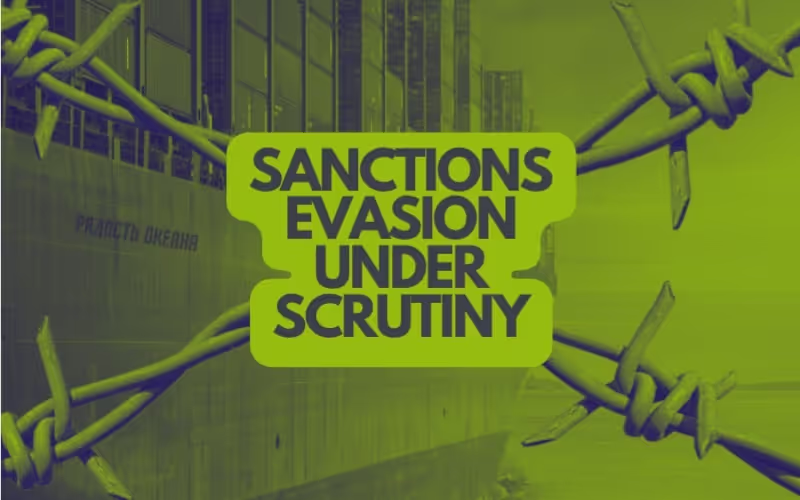
Increasing Scrutiny on Evading Sanctions: Be Aware
In this article, we'll look at how 2023 has begun with increasing scrutiny on the issue of sanctions evasion. Compliance officers need to beware that the stakes for non-compliance are rising.
The world of sanctions evasion is increasingly a hot topic. And not only in the relatively small arena of regulatory compliance.
Intriguing and mysterious stories (since the start of the Russo-Ukrainian War) of sanctioned Russian oligarchs moving around super-yachts, like pieces on a chess board to avoid seizure, have made national news. It's even capturing the general public's imagination because the storyline reads more like a movie script.
And as we'll discover in this article, authorities with the ability to impose multi-million dollar regulatory fines are ratcheting up the pressure on companies to get sanctions compliance under control.
This is what the article will cover:
- Increasing Scrutiny on Evading Sanctions
- DOJ: More Prosecutions Coming?
- OFAC Calls For Rigorous Compliance Controls
- Sanctions Compliance Should Be a Top Concern
- SMEs & Start-Ups Get Fined For Sanction Breaches Too
- How to Start Mitigating the Risk of Sanctions Violations
Increasing Scrutiny on Sanctions Evasion
The increased news coverage on how shadowy characters and elusive shell companies evade sanctions puts it in the spotlight. And when issues become a public talking point - especially ones that involve national security - that usually means a response by governments to alleviate the public's concerns.
And as many of you are aware, the political will is stronger than ever, and the response is already in action.
DOJ: More Prosecutions Coming?
All compliance officers should know that the United States Department of Justice (DOJ) is on a 2023 hiring spree. And it involves going after companies that breach sanctions and violate export controls. The DOJ announced in March 2023 that it plans to hire over 25 new prosecutors to meet this objective.
And any company or organization with international trading partners, customers, and stakeholders risks getting into a legal quagmire with severe financial penalties for sanctions violations.
That's because bodies that can punish sanctions breaches, such as the Office of Foreign Assets Control (OFAC), the DOJ, the UK Office of Financial Sanctions Implementation (OFSI), the European Union's (EU) Sanctions Committee, and many more, do prosecute companies and organizations for unknowingly enabling sanctions evasion.
And remember, there is also an increasing spotlight on compliance officers' personal liability for compliance failings of the organization they work for - including for sanctions violations.
OFAC Calls For Rigorous Compliance Controls
It's not only the DOJ that's ramping up the pressure. OFAC, in March 2023, recommended that companies initiate rigorous compliance controls in light of Russia-related sanctions. It's strong language from OFAC. The stakes are increasing, and companies (and their compliance officers) failing to implement effective sanctions compliance controls risk severe financial and reputational damage.
Companies and organizations must prioritize and invest in rigorous compliance controls, such as effective sanctions screening processes, to mitigate exposure risk and ensure they meet their obligations under sanctions regimes.
Sanctions Compliance Should Be a Top Concern
If sanctions compliance still needs to be a top concern, now is the time to prioritize it.
Most of us know that sanctions compliance has been on the agenda for some years due to increasing international efforts to combat money laundering, terrorist financing, and other financial crimes.
And compliance with these sanctions regimes has become an essential aspect of compliance risk management for companies and organizations that operate internationally. But, given the events over the last 12 months, sanctions compliance is becoming a major priority and significant concern for global businesses and international organizations. Companies increasingly need a strong understanding of sanctions screening processes to mitigate the risk of violations.
SMEs Get Fined For Sanction Breaches Too
Here is a reality of the sanctions compliance world: Bodies that can punish you with substantial financial penalties for sanctions breaches do not care if the company has zero employees or 100,000.
And over the years, businesses, including smaller companies, have been fined for sanctions violations. Many companies, especially SMEs, start-ups, and small businesses, find the increased scrutiny on sanctions compliance complex, daunting, and is becoming a headache.
If this is something that's also been a challenge for your business or organization - help is on the way in the following section.
Start Mitigating the Risk of Sanctions Violations
The quickest and easiest way to mitigate the risk of sanctions violations within your business or organization is to have a sanctions screening strategy. And part of that strategy will include utilizing a sanctions screening technology partner - such as sanctions.io. But first, if you aren't sure or need a refresh, here is some information about sanctions screening:
What is Sanctions Screening?
Sanctions screening is screening individuals, groups, or companies against specific sanction lists based on the territories where an organization operates, the currencies they deal in, and their partnerships and alliances.
Screening checks also can include PEP (Politically Exposed Person) lists and other watchlists (such as FBI Most Wanted & Interpol Red Notices), as offered by sanctions.io. It's achieved by manually entering a name into an online tool, reviewing a customer database for sanctions alerts in bulk, or regularly screening customer and stakeholder databases.
sanctions.io's AI-powered database updates every 15 minutes and includes a proprietary search algorithm that helps reduce false positives.
Build Your Sanctions Strategy With Our Sanctions Screening Guide
In sanctions.io's Sanctions Screening Guide, you can kick-start the development of your sanctions strategy. It covers the following and more:
- Who needs to comply and screen against sanctions lists?
- Defining the relevant sanctions lists for your business
- Preparing and streamlining your data
- Data points for your screening process
Final Thoughts
The issue of evading sanctions is increasingly in the spotlight and has become a significant concern for global companies and smaller businesses operating across borders. The stakes are high, and companies failing to implement effective sanctions compliance controls risk severe financial and reputational damage.
Prioritizing sanctions risk is critical. Companies must invest in rigorous compliance controls, such as effective sanctions screening processes, to mitigate exposure risk and ensure they meet their obligations under sanctions regimes.
Compliance teams can employ various tactics to prevent and detect sanctions evasion schemes, including using sanctions screening technology to identify and flag potential evaders. To learn more about sanctions screening, sanctions.io's ultimate guide to sanctions screening is an excellent resource to get started.
For ways to detect and prevent sanctions violations within your organization, contact sanctions.io for an obligation-free discussion.



